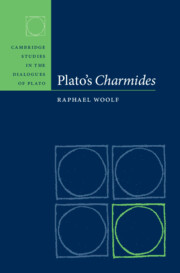Book contents
- Plato’s Charmides
- Cambridge Studies in the Dial Ogues of Plato
- Plato’s Charmides
- Copyright page
- Dedication
- Contents
- Acknowledgements
- Chapter 1 Introduction
- Chapter 2 The Stance of Enquiry
- Chapter 3 Charmides, Eros and the Unity of the Dialogue
- Chapter 4 Interpreting Temperance
- Chapter 5 The Art of Self-Realisation
- Chapter 6 Conclusion
- References
- Index of Ancient Passages
- General Index
Chapter 4 - Interpreting Temperance
Published online by Cambridge University Press: 20 July 2023
- Plato’s Charmides
- Cambridge Studies in the Dial Ogues of Plato
- Plato’s Charmides
- Copyright page
- Dedication
- Contents
- Acknowledgements
- Chapter 1 Introduction
- Chapter 2 The Stance of Enquiry
- Chapter 3 Charmides, Eros and the Unity of the Dialogue
- Chapter 4 Interpreting Temperance
- Chapter 5 The Art of Self-Realisation
- Chapter 6 Conclusion
- References
- Index of Ancient Passages
- General Index
Summary
This chapter analyses in detail the major part of Socrates’ long and complex discussion with Critias about the nature of temperance. Central to the discussion is Critias’ proposal that temperance is knowing oneself. It is argued that this discussion brings out several important ways in which Socrates and Critias differ from one another. One is in their respective attitudes towards interpretation: while Socrates is negligent of interpreting the words of others, Critias shows a keen interest in the interpretation of texts. A second difference is in the pair’s conception of self-knowledge. It is argued that Critias’ conception is based on what I call a social authority model, while Socrates’ is based on what I call a reflective model. It is shown that, despite the heavily aporetic nature of the discussion, a substantive conception of temperance can be gleaned from critical engagement with that discussion.
Keywords
- Type
- Chapter
- Information
- Plato's Charmides , pp. 145 - 207Publisher: Cambridge University PressPrint publication year: 2023

